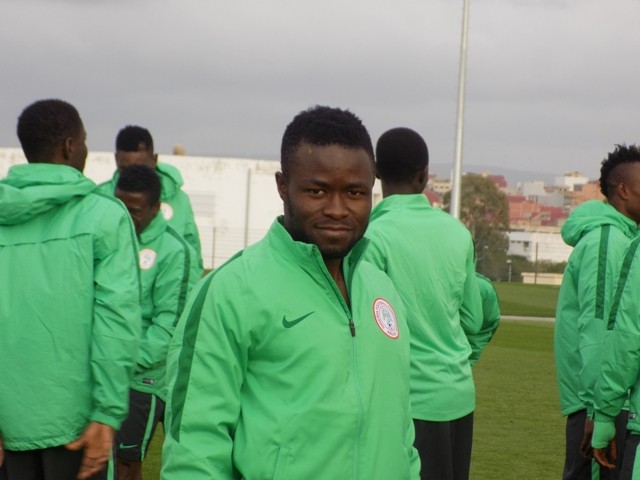Newly-appointed Nigeria Under-20 coach Paul Aigbogun on Friday executed his first piece of task in charge of the national side – the release of a list of players with whom he intends to prosecute the qualifying series of the 2019 Under-20 Africa Cup of Nations.
How efficient or accurate was Aigbogun’s ‘first touch’ as the Flying Eagles handler? Our Chief Football Writer FISAYO DAIRO takes a look at the list and believes that the cankerworm that has masticated on Nigerian football for years is not ready to go away.
To start with, it is expected (at least by my humble self) that the task of coaching the Under-20 team this year will not be an easy one for any coach in the land, let alone one that has a full day-to-day job.
This is so because the previous National Under-17 set which naturally should form the nucleus of this Under-20s failed to qualify for the African Championship and so, in our normal ways, discarded the lot – talk of throwing away the baby and the bath water.
Since there was almost nothing on ground in terms of structure or personnel to work with, one can imagine the sort of work Mr Aigbogun and his crew would have done just to put together a list of players that will be eligible to play for the country at that level.
The top flight league in Nigeria hardly helps his cause as league coaches (including the Under-20 handler) always favour ‘old’, recycled legs, most times at the detriment of emerging ones.
It is also not a surprise that the three Under-20 players who represented Nigeria at the recently held African Nations Championship (CHAN) in Morocco were the first names on the list because, at least, they have a database aided by their participation in a major competition. For the rest of the selection, they are purely based on guessing and/or speculation on their eligibility since there is no articulate framework to run to.
Allegations of cheating
No sooner had the list been released by the Football Federation than analysts and journalists across Nigeria take to social media to express one reservation or the other about one, two or three players in the list of twenty-eight.
Their major yardstick which could be the only empirical evidence available in a country with abject disdain for record keeping like ours is; the number of seasons such player had played in Nigeria’s first two divisions.
Our findings
The first name that came to my attention was Douglas Achiv, a good central midfielder who was dropped at the dying minutes of preparation for CHAN 2018 by coach Salisu Yusuf.
I discovered that Achiv was also invited to camp by late Stephen Keshi for 2014 CHAN and featured for the first time in the NPFL for Lobi Stars in the 2013 season.

However, as being emphasised in this article, there is no record to prove or disprove that Achiv was just an exceptional 13-year old in 2013.
Also on the list is goalkeeper Ospino Egbe who is in his third NPFL season with Church side MFM FC of Lagos.
My findings reveal that Egbe was third choice goalkeeper at Ocean Boys of Brass in 2010 and famously had an auto accident with his teammate then, Okey Akabogu.
Ospino however seemingly went under the radar before resurfacing at MFM, perhaps making the selectors believe he is just playing his third league season. His case is however complicated by the tweet below, showing his year of birth as 1992.
https://twitter.com/WA_Foot/status/835950309969113089
One other player whose eligibility has been questioned incidentally is Moses Peter Eneji. He earned himself an infamous red card at the 2018 CHAN final and records available with the Confederation of African Football states that he was born on April 4, 1999.
Eneji, our findings revealed joined Dolphins FC (now Rivers United) in mid 2013/14 season from Unicem Rovers of Calabar but left the Port Harcourt side at the end of the season.
That suggests that the flying winger started his career so early and was brilliant enough to be playing for second division side UNICEM at 15.
Considering where Nigeria and sub-Saharan Africa are coming from with regard to cases of age issues, it must be stated that 3/28 is a wonderful score but the problem inherent in this is the inability to trace the records of other players invited to the team. Players like Adesina Gata, Joseph Abiodun have also been speculated with traces of being overaged but where is the concrete evidence to lay claim to that?
It is glaring, even to the blind that this is a societal problem as not only footballers but civil servants, Professors and Politicians have been discovered to have falsified their ages at one time or the other. The society clearly gives these micro organisms enough broth and growth culture to manifest themselves in the future.
Since it is never too late to start, it can be recommended that the secrecy which has clouded the dates of births of players in the leagues must be removed so that everyone knows right from the onset.
With the advent of the laudable NPFL Under-15 Promises, there is an urgent need for players’ data to go directly into a database starting from the regional qualification level as that is the only way the league stars of ten, fifteen years to come can be monitored.
The NFF release included a clause which perhaps was suggestive that the Football House are in the dark as regards some of their dates of births and that has passed the message that this niggling thorn in the flesh of Nigerian football still basks in the absence of database.
“All invited players are to arrive at the Serob Legacy Hotel, Wuye, Abuja between Sunday, 25th February and Monday, 26th February, with their international passports, birth certificates and training kits.”














